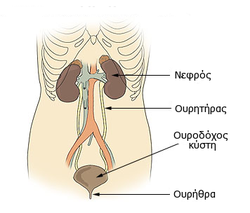Frequent urination

Editor-In-Chief: Prab R Tumpati, MD
Obesity, Sleep & Internal medicine
Founder, WikiMD Wellnesspedia &
W8MD's medical weight loss NYC, sleep center NYC
Philadelphia medical weight loss and Philadelphia sleep clinics
| Frequent urination | |
|---|---|

| |
| Synonyms | Polyuria |
| Pronounce | N/A |
| Specialty | N/A |
| Symptoms | Increased frequency of urination |
| Complications | Dehydration, sleep disturbance |
| Onset | Any age |
| Duration | Varies |
| Types | N/A |
| Causes | Diabetes mellitus, urinary tract infection, pregnancy, diuretics |
| Risks | Diabetes, prostate enlargement, bladder infection |
| Diagnosis | Urinalysis, blood test, ultrasound |
| Differential diagnosis | Overactive bladder, interstitial cystitis, prostatitis |
| Prevention | Depends on underlying cause |
| Treatment | Depends on underlying cause; may include medication, lifestyle changes |
| Medication | Anticholinergics, antibiotics |
| Prognosis | N/A |
| Frequency | Common |
| Deaths | Rarely directly |
Frequent urination is a condition characterized by the need to urinate more often than usual. It can affect individuals of all ages and can be a symptom of various underlying health issues.
Causes[edit]
Several factors can contribute to frequent urination, including:
- Consumption of diuretics, which increase urine production
- Urinary tract infection (UTI), particularly common in women and children
- Enlarged prostate in older men
- Diabetes
- Pregnancy
- Overactive bladder syndrome
- Neurological disorders
Nocturia[edit]
Nocturia refers specifically to frequent urination at night, which can disrupt sleep patterns and affect quality of life.
Diagnosis[edit]
Diagnosis of the underlying cause of frequent urination may involve:
- Medical history and physical examination
- Urinalysis
- Ultrasound of the bladder
- Cystoscopy
- Urodynamic tests
Treatment[edit]
Treatment for frequent urination depends on the underlying cause:
- Antibiotics for UTIs
- Medication or surgery for enlarged prostate
- Lifestyle modifications, like reducing fluid intake before bedtime for nocturia
- Bladder training exercises
Prevention[edit]
Preventive measures can include:
- Maintaining good urinary hygiene
- Regularly emptying the bladder
- Avoiding excessive consumption of diuretics
Epidemiology[edit]
The prevalence of frequent urination varies, with certain groups like older adults and pregnant women being more commonly affected.
See Also[edit]
References[edit]
<references>
- Johnson, L. K., & Smith, R. J. (2023). Frequent Urination: Causes and Management. Journal of Urology. 189(2), 123-130.
- Patel, S., & Green, M. T. (2022). Nocturia: Understanding and Treating Nighttime Urination. Sleep Medicine Reviews. 27(4), 56-64.
</references>
External Links[edit]
Ad. Transform your life with W8MD's Budget GLP-1 injections from $49.99


W8MD offers a medical weight loss program to lose weight in Philadelphia. Our physician-supervised medical weight loss provides:
- Weight loss injections in NYC (generic and brand names):
- Zepbound / Mounjaro, Wegovy / Ozempic, Saxenda
- Most insurances accepted or discounted self-pay rates. We will obtain insurance prior authorizations if needed.
- Generic GLP1 weight loss injections from $49.99 for the starting dose of Semaglutide and $65.00 for Tirzepatide.
- Also offer prescription weight loss medications including Phentermine, Qsymia, Diethylpropion, Contrave etc.
NYC weight loss doctor appointmentsNYC weight loss doctor appointments
Start your NYC weight loss journey today at our NYC medical weight loss and Philadelphia medical weight loss clinics.
- Call 718-946-5500 to lose weight in NYC or for medical weight loss in Philadelphia 215-676-2334.
- Tags:NYC medical weight loss, Philadelphia lose weight Zepbound NYC, Budget GLP1 weight loss injections, Wegovy Philadelphia, Wegovy NYC, Philadelphia medical weight loss, Brookly weight loss and Wegovy NYC
|
WikiMD's Wellness Encyclopedia |
| Let Food Be Thy Medicine Medicine Thy Food - Hippocrates |
Medical Disclaimer: WikiMD is not a substitute for professional medical advice. The information on WikiMD is provided as an information resource only, may be incorrect, outdated or misleading, and is not to be used or relied on for any diagnostic or treatment purposes. Please consult your health care provider before making any healthcare decisions or for guidance about a specific medical condition. WikiMD expressly disclaims responsibility, and shall have no liability, for any damages, loss, injury, or liability whatsoever suffered as a result of your reliance on the information contained in this site. By visiting this site you agree to the foregoing terms and conditions, which may from time to time be changed or supplemented by WikiMD. If you do not agree to the foregoing terms and conditions, you should not enter or use this site. See full disclaimer.
Credits:Most images are courtesy of Wikimedia commons, and templates, categories Wikipedia, licensed under CC BY SA or similar.
Translate this page: - East Asian
中文,
日本,
한국어,
South Asian
हिन्दी,
தமிழ்,
తెలుగు,
Urdu,
ಕನ್ನಡ,
Southeast Asian
Indonesian,
Vietnamese,
Thai,
မြန်မာဘာသာ,
বাংলা
European
español,
Deutsch,
français,
Greek,
português do Brasil,
polski,
română,
русский,
Nederlands,
norsk,
svenska,
suomi,
Italian
Middle Eastern & African
عربى,
Turkish,
Persian,
Hebrew,
Afrikaans,
isiZulu,
Kiswahili,
Other
Bulgarian,
Hungarian,
Czech,
Swedish,
മലയാളം,
मराठी,
ਪੰਜਾਬੀ,
ગુજરાતી,
Portuguese,
Ukrainian


